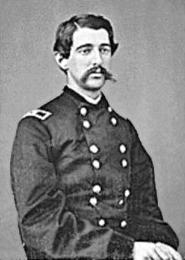William H. Seward Jr. facts for kids
Quick facts for kids
William H. Seward Jr.
|
|
|---|---|
 |
|
| Personal details | |
| Born |
William Henry Seward Jr.
June 18, 1839 Auburn, New York |
| Died | April 29, 1920 (aged 80) Auburn, New York |
| Resting place | Fort Hill Cemetery, Auburn, New York |
| Spouse | Janet MacNeil Watson |
| Children | 3 |
| Parents | William H. Seward Frances Adeline Miller |
| Military service | |
| Allegiance | United States of America Union |
| Branch/service | United States Army Union Army |
| Years of service | 1862–1865 |
| Rank | |
| Commands | 9th New York Heavy Artillery Regiment |
| Battles/wars | American Civil War |
William Henry Seward Jr. (born June 18, 1839 – died April 29, 1920) was an American banker and a high-ranking officer, called a brigadier general, in the Union Army during the American Civil War. He was the youngest son of William Henry Seward Sr., who was a very important government official, the United States Secretary of State, serving under Presidents Abraham Lincoln and Andrew Johnson.
Contents
Early Life and Family
William Henry Seward Jr. was born in Auburn, New York. His father, William Henry Seward Sr., had just become the Governor of New York when William Jr. was born. His mother, Frances Adeline Seward, was the daughter of Judge Elijah Miller. Judge Miller was a law partner of Seward Sr. and built the family home in Auburn in 1816.
William Jr. had two older brothers. Augustus Henry Seward was a colonel in the army's Paymaster Corps, which handled money. His other brother, Frederick William Seward, worked as an Assistant Secretary of State alongside their father.
His Career Path
Starting in Banking
William Jr. was taught at home. He became very interested in money and finance. In 1860, he worked as a private secretary for his father, who was then a U.S. Senator from New York. In 1861, he opened his own private bank in Auburn.
However, his banking career was put on hold. On August 22, 1862, he left his bank to join the Union Army and fight in the American Civil War.
A Soldier in the Civil War
William Jr. was first made a lieutenant colonel in New York's 138th Infantry Regiment. This group later became the 9th New York Heavy Artillery Regiment in December 1862. His regiment helped defend Washington, D.C.
Later, his regiment was changed back to an infantry group. They were sent to join the Army of the Potomac because that army had lost many soldiers. After fighting in the Battle of Cold Harbor, William Jr. was promoted to colonel of his regiment on June 10, 1864.
A few weeks after his promotion, his regiment was sent north again. They needed to protect Washington, D.C., from Confederate Lieutenant General Jubal Early. During the Battle of Monocacy on July 9, 1864, William Jr. was hurt. His horse was shot, fell on him, and broke his leg. He was also slightly wounded in his arm.
Despite his injuries, he was promoted to brigadier general on September 13, 1864. In January 1865, he was given command of a brigade in West Virginia, which he led until April 1865. From then on, his family called him "The General."
Life After the War
William Jr. officially left the army on June 1, 1865. After the war ended, he went back to his banking career. He lived with his wife in the family home in Auburn, New York.
Besides banking, he was also involved in politics and helped with charity work. He joined patriotic and historical groups. He also became a director for several companies.
Personal Life
William Henry Seward Jr. married Janet MacNeil Watson (1839–1913). They had three children together:
- Cornelia Margaret Seward Allen (1862–1921)
- William Henry Seward III (November 10, 1864 – February 16, 1951)
- Frances Janet Seward Messenger (1880–1957)
William Henry Seward Jr. passed away in Auburn, New York, on April 26, 1920. He was 80 years old. He is buried in Auburn's Fort Hill Cemetery, right next to his father.
 | Frances Mary Albrier |
 | Whitney Young |
 | Muhammad Ali |

